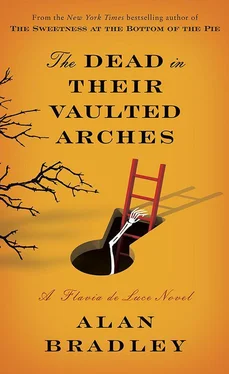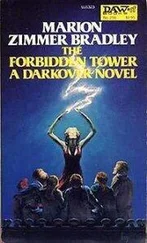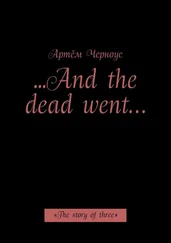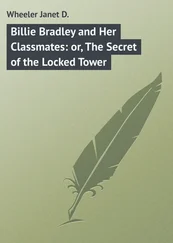I thought for a moment that it might be a simple substitution cipher, one of those parlor games in which A equals B and B equals C that our governess Miss Gurdy used to force us to play on rainy afternoons before the Troubles. But if Harriet’s message was worth writing in code, it would not be one so easily broken.
The obvious solution, of course, would be to show it to Aunt Felicity—the Gamekeeper herself. She would know how best to handle it.
And yet something was keeping me from doing so. I had handed over Harriet’s will to Father because it was the right thing to do. But this message from my mother was a different thing entirely.
Why?
It’s hard to put your finger on it. For one thing, the will was personal. It was meant to convey Harriet’s wishes—whatever they might have been—to her family. But an invisible message on the outside of a packet was aimed at someone else entirely.
That, at least, was my thinking.
And then, of course, there was the undeniable fact that I wanted to keep something for myself. I could easily give the packet to Inspector Hewitt and let him bask in the glory of cracking the code—if he was able to.
But wouldn’t that be, in a sense, giving away what little remained of my mother?
Quite honestly, I didn’t want to share Harriet’s last two words: not with Father, not with Aunt Felicity, not with the police—not with anyone. I felt that, in some weird way, the words, as they had taken form from nothingness in the heat of the Bunsen burner, were meant for me, that they were mine alone.
It may sound idiotic, but there it was.
I would tell no one.
I turned off the gas to the Bunsen burner and watched as the flame went out, leaving the room colder and somehow sadder than ever.
I pulled the bathrobe tightly round my neck and sat with my heels hooked on one of the stool’s rungs, thinking about what Aunt Felicity had told me.
Harriet had been making her way home by way of India and Tibet. Someone had betrayed her. She was followed.
On the glacier, she had fallen.
Or had she been pushed?
It was uncomfortably like what had happened to the man on the railway platform at Buckshaw Halt. Could it be a coincidence?
Or was it more than that?
Was Harriet to go to her grave a murder victim?
There was a polite knock on the door. I knew who it was even before I said “Come in.”
Dogger came slowly into the room.
“It’s time, Miss Flavia,” he said quietly.
I took a deep breath.
This was it.
The moment I had been dreading all my life.
TWENTY-SEVEN
FATHER WAS NOT A person who wore his heart on his sleeve. In fact, I sometimes used to wonder if he kept it anywhere about his person at all. Perhaps, I thought, his heart was preserved in some icy cave: in some frozen glacier of his mind.
But now, as I perched on the jump seat of Harriet’s Rolls-Royce, I could tell by Father’s face the agony he was in.
The more pain he felt on the inside, the less he showed on the outside.
Why hadn’t I realized that years ago?
His face was like a photographic negative of his soul: White was black and black was white—exactly like the ciné film I had developed. He had been trained to be utterly impassive, and how very, very good at it he had become!
He was staring blankly out the window at the passing hedgerows as if he was no more than someone in the city, going up to London for another day of boredom at a varnished desk in some ghastly office. Seated between Feely and Daffy, he did not notice that I was studying him.
How gray he was, and how pale.
Sometime within the next hour , I thought, this man is going to watch his beloved put into the earth .
Harriet, at this very moment, was ahead of us in the hearse, in a box, which had been draped once more with the Union Jack.
She would be brought briefly into the church, a few words would be said, and that would be that.
I had attended enough funerals to know by now that all the comforting words of the vicar could never be enough, that the vivid imaginations of the mourners would more than cancel them out. All the sober words of John and Job and Timothy could not put Harriet de Luce together again, and I could only hope that our Lord Jesus Christ would have better luck resurrecting my mother than I had had.
I know it sounds bitter, but that is what I was thinking.
Daffy was clutching the Book of Common Prayer from which stuck out at every angle a messy sandwich of papers. She had been asked by the vicar to speak briefly about our mother, and although she had at first protested, she had finally come round and grudgingly agreed. I could tell by the smudges that her penciled writing had been erased again and again in an attempt to bring it up to the standards of Dickens, say, or Shakespeare.
I pitied her.
Feely had a folio of organ music on her lap. She, at least, would have the distraction of remembering to hit the right keys and pedals and would not be left, as the rest of us were, with nothing to look at but the coffin. That’s the beauty of being an organist, I suppose: Business first, no matter what.
Adam and Tristram were following us with Lena and Undine in Lena’s Land Rover. Adam had offered to drive, and Lena had accepted. Adam’s old Rolls with its roof stripped away and overflowing with potted seedlings was not fit to be seen parked outside the church during a funeral, and so it had been left behind at Buckshaw.
Mrs. Mullet and her husband, Alf, were following in Clarence Mundy’s taxicab. Mrs. M had draped her face with a black veil before setting out and would not remove it “until,” she said, “Miss ’Arriet is laid to rest proper like.”
“Bishop’s Lacey ’as never seen Margaret Mullet cry,” she had whispered to me fiercely, “nor will they.”
Alf, wearing full medals, had put his hand on her arm and said, “Steady on, old girl,” and it was only then I realized that beneath her black pall, his wife was already quaking with tears.
The churchyard and the road in front of it were simply crawling with people, so Dogger was forced to slow the Rolls to a snail’s pace. We were fish in a tank with faces staring in at us through the glass.
Puffy white clouds floated solemnly overhead, dappling the landscape with shadows of sadness.
It was dreadful. Simply dreadful, and the tolling of the great bell in the tower somehow made it even worse.
All eyes were upon us as we stepped down from the Rolls, and a murmur swept like a wave through the crowd, although I couldn’t make out what they were saying.
“That’s Dame Agatha Dundurn,” Daffy whispered, swiveling her eyes repeatedly in the direction she wanted me to look.
“The Air Vice-Marshal?” I asked from the corner of my mouth.
“Something like that,” Daffy replied. “She parachuted into Arnhem.”
“Good lord!” I said, although it didn’t take much imagination to see her doing it. The woman was a cannonball with stripes on its sleeves.
We both of us jumped as our elbows were pinched.
“Please shut up,” Feely said in a low voice. “This is a funeral—not a mop fair.”
She shot us a villainous look and moved off alone in the direction of the porch, her music clutched far too tightly in her fist. Nobody tried to stop her.
The vicar met us at the lych-gate, and we stood in awkward silence as Harriet’s coffin was removed gently from the hearse by the six pallbearers, all of them men, and all of them strangers, except for Dieter, upon whose broad shoulder Harriet’s head was now resting. Tongues would soon be wagging in Bishop’s Lacey, I knew.
“Father insisted,” Daffy whispered.
Читать дальше












